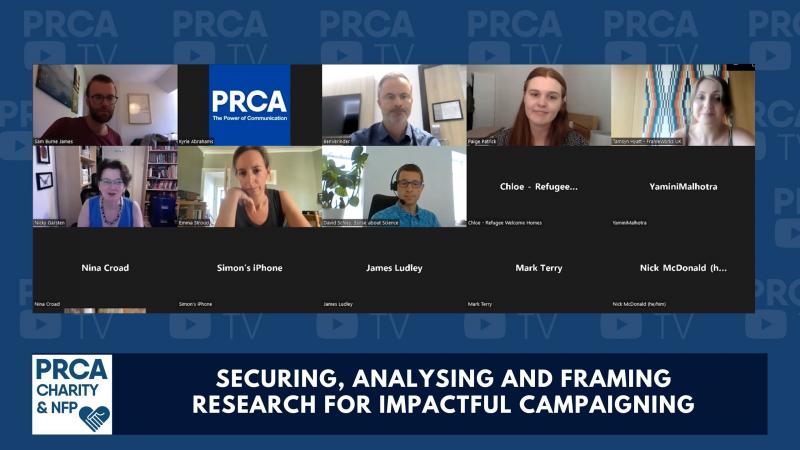
Impactful third sector campaigns are maximised through the foundation of thorough research. Influential messages, tailored to specific stakeholders, are shaped through the process of careful information collection. Yet, not-for-profit organisations campaign budgets can often be limited. Here we share our top tips on how to manage resources and achieve maximum campaign effectiveness through research.
Our specialist panel, co-chair Dr Nicky Garsten FPRCA, Associate Professor of Communications at the University of Greenwich and Co-Editor of 'Communicating Causes: Strategic Public Relations in the Not-for-Profit Sector, is joined by Paige Patrick, Digital Communications Manager at Media Trust, discussing how to secure, analyse, and frame research for efficient and effective campaigning. Hosted by The Charity Group, we welcomed experts in the field to spark insightful conversation, explained through anecdotal experience.
Informing your campaign
Formative research holds significant value within a campaign and is a principal factor in a project’s initial stages. Ben Verinder, Founder and Managing Director at Chalkstream, encouraged making the most of free sources of information combined with your own data sets. A plethora of free information hubs are available to strengthen a campaign’s data collection, enabling professionals to benchmark attitudes, awareness, and behaviours to measure your campaign’s results against – such as Nomis, Ofcom's media literacy studies and the British Social Attitudes series.
Proprietary data is important to consider and can be used in many ways to inform campaign planning including analysis of the demographics of service data or of fundraising trends over time. It can also be used for primary research covering all key factors present in the campaign.
Bridging audience behaviour
Campaigning for change requires detailed audience research. Understanding an audience’s barriers and motivations is vital to move them through the cycle of awareness, knowledge, intention and ultimately, action. Emma Stroud, Marketing and Communications Manager at the Metropolitan Police, reinforced how important research is to identify and shift barriers to behavioural change and shape campaign strategy.
Demonstrated by the results of a multi-award-winning campaign to change behaviour around reporting knife crime intelligence in London, ‘Hard Calls Save Lives’, Emma describes the campaign’s initial research as “worth its weight in gold”. These insights assisted in understanding the target audience’s situations, ensuring they received persuasive and incentivised communications. The campaign itself, led by mothers who have lost their sons to knife crime, was successful in achieving the campaign’s objectives.
Standing for social change
Tamsyn Hyatt, Principal Communications Strategist at FrameWorks UK, diagnosed the “conversation of change”, describing how framing research can drive social change campaigning. Framing draws from the social and cognitive sciences to explore how presenting information in different ways shapes the way people think, feel and are willing to act on social issues.
Within social issue campaigns, there are three types of change: behaviour, awareness, and context. Framing social issues is crucial to changing context: when backed by purposeful research, it builds public and political will to change systems, structures, and policies. Tamsyn shared three cross-cutting insights from FrameWorks’ research: lead with what you’re for (not what you’re against), bring systems change to life, and finally, normalise action (not inaction)!
You can re-watch ‘Securing, Analysing and Framing Research for Impactful Campaigning’ by visiting: Our PRCA TV Channel
